REPORT OUTLOOK
| Market Size | CAGR | Dominating Region |
|---|---|---|
| USD 13.46 billion by 2030 | 10.5% | North America |
| by Deployment | by Organization | by Industry |
|---|---|---|
|
|
|
SCOPE OF THE REPORT
Project Management Software Market Overview
The global Project Management Software market size was is projected to grow from USD 6.69 billion in 2023 to USD 13.46 billion by 2030, exhibiting a CAGR of 10.5% during the forecast period.
A project management software is a digital tool or program that assists individuals and teams in efficiently planning, coordinating, and managing projects. This program provides a centralized platform for project managers and team members to interact, measure progress, and guarantee that tasks are done within the timeframes specified. It usually includes elements like task scheduling, resource allocation, budgeting, document sharing, and communication tools. Project management software is useful for improving processes, improving communication, and enabling team collaboration, especially in projects with several tasks, dependencies, and contributors. It provides stakeholders with real-time visibility into project status, enabling them to monitor progress, identify bottlenecks, and make educated choices. The software is applicable to a wide range of sectors and project kinds, ranging from software development and construction to marketing campaigns and event planning, and it offers a planned and coordinated approach to project execution. The Project Management Software market is critical in today’s corporate environment due to its critical role in improving efficiency, collaboration, and organization across many sectors. As organizations and projects become more complicated and globally scattered, the demand for effective project management software has expanded rapidly. Project Management Software provides a consolidated platform for task planning, execution, and monitoring, allowing teams to work more efficiently, stick to deadlines, and manage resources more effectively.
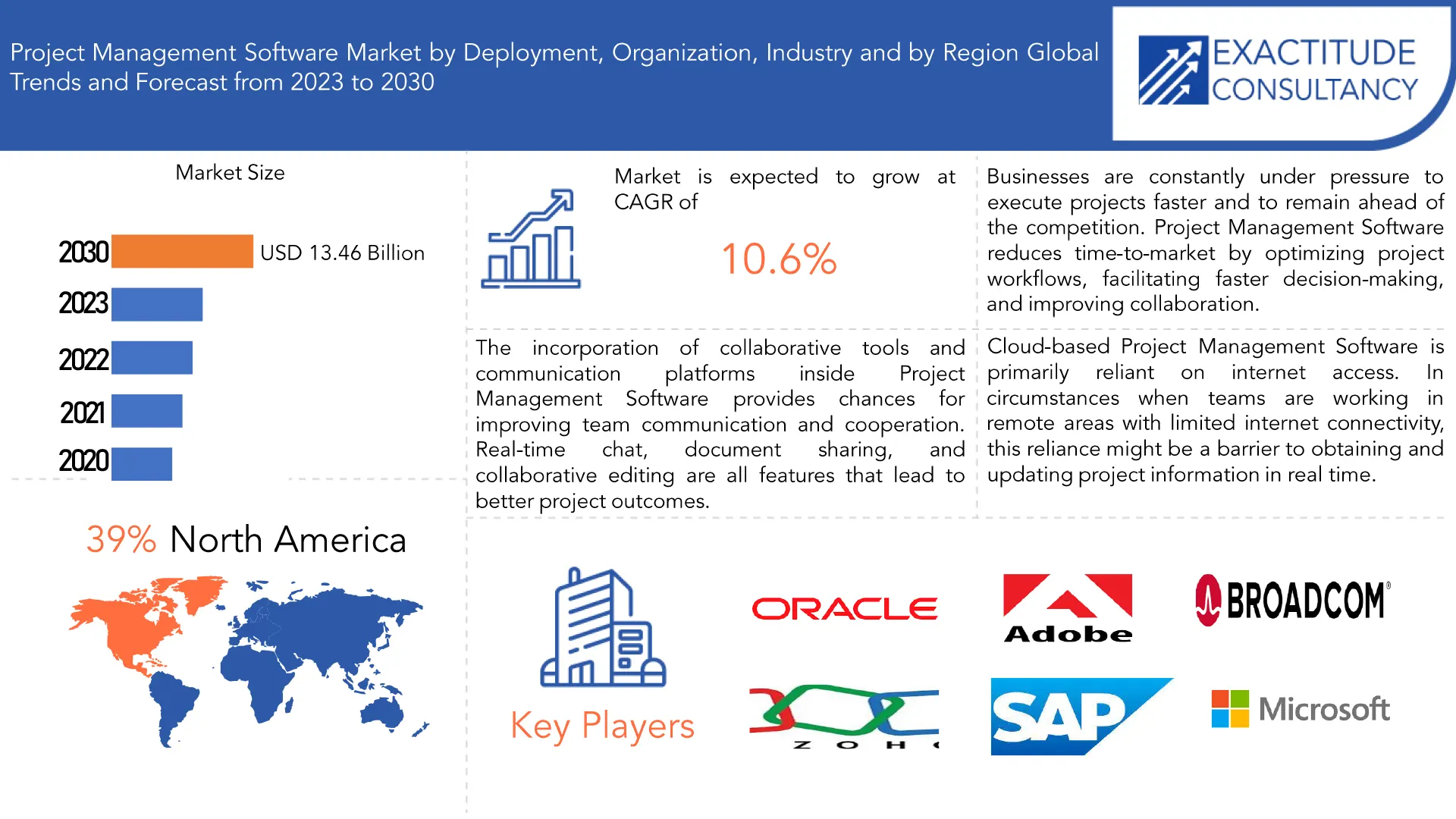
The market significance stems from its capacity to simplify workflows, minimize project risks, and increase communication, all of which contribute to effective project results. These software solutions, which include capabilities like as task tracking, resource allocation, budget management, and real-time reporting, enable firms to make educated decisions, quickly respond to changes, and maximize project delivery. As companies understand the need of organized project management practices, the demand for sophisticated Project Management Software grows, making it a critical component for project success and organizational growth in today’s competitive climate. As businesses across numerous sectors discover the transformational benefits of effective project management, the breadth of the Project Management Software market is expanding and growing. With increased project complexity and a greater emphasis on collaboration and agility, there is a greater need for solid project management solutions. The scope includes IT and software development, construction, healthcare, manufacturing, marketing, and more. Project Management Software supports a wide range of project types, from small-scale efforts to large-scale, complicated projects, and includes features such as task and timetable management, resource allocation, budget monitoring, and collaborative communication capabilities. As firms become more global, the breadth of the software expands to serve teams working in multiple geographical areas, enabling real-time collaboration. A wide range of services, including cloud-based solutions, on-premises software, and mobile apps, which provide enterprises with diverse demands with flexibility, distinguishes the market. With a growing emphasis on data-driven decision-making, the scope of Project Management Software now includes advanced analytics and reporting capabilities, allowing stakeholders to get insights into project performance.
| ATTRIBUTE | DETAILS |
| Study period | 2020-2030 |
| Base year | 2022 |
| Estimated year | 2023 |
| Forecasted year | 2023-2030 |
| Historical period | 2019-2021 |
| Unit | Value (USD Billion) |
| Segmentation | By Deployment, Organization, Industry and Region |
|
By Deployment |
|
By Organization |
|
|
By Industry |
|
|
By Region
|
|
Project Management Software market Segmentation Analysis
The global Project Management Software market is bifurcated into four segments, by deployment, organization, industry and region. By deployment, the market is bifurcated into cloud, on-premises. By organization, the market is divided into large enterprises, SMEs and by region.
Based on deployment, the market is bifurcated cloud and on premise. Cloud-based project management software includes hosting the program and data on remote servers that are accessible over the internet. Because of its scalability, flexibility, and accessibility from anywhere with an internet connection, this deployment option has grown significantly in recent years. Cloud solutions are frequently preferred by businesses due to their cost-effectiveness, as they reduce the need for major upfront infrastructure expenditures. The pay-as-you-go concept enables simpler scaling, making it suited for both small and large organizations. Cloud-based solutions’ market share is growing as more businesses see the benefits of remote access, automated upgrades, and collaborative capabilities. On-premises project management software is deployed and managed using the organization’s in-house server infrastructure. This deployment strategy gives enterprises better control over their software and data, but it demands significant upfront investments in hardware, software licensing, and upkeep. While on-premises solutions offer a high level of flexibility and protection, they may lack the agility and accessibility associated with cloud-based options. On-premises solutions’ market share is progressively declining as cloud use increases, particularly among enterprises seeking cost savings and better collaboration.
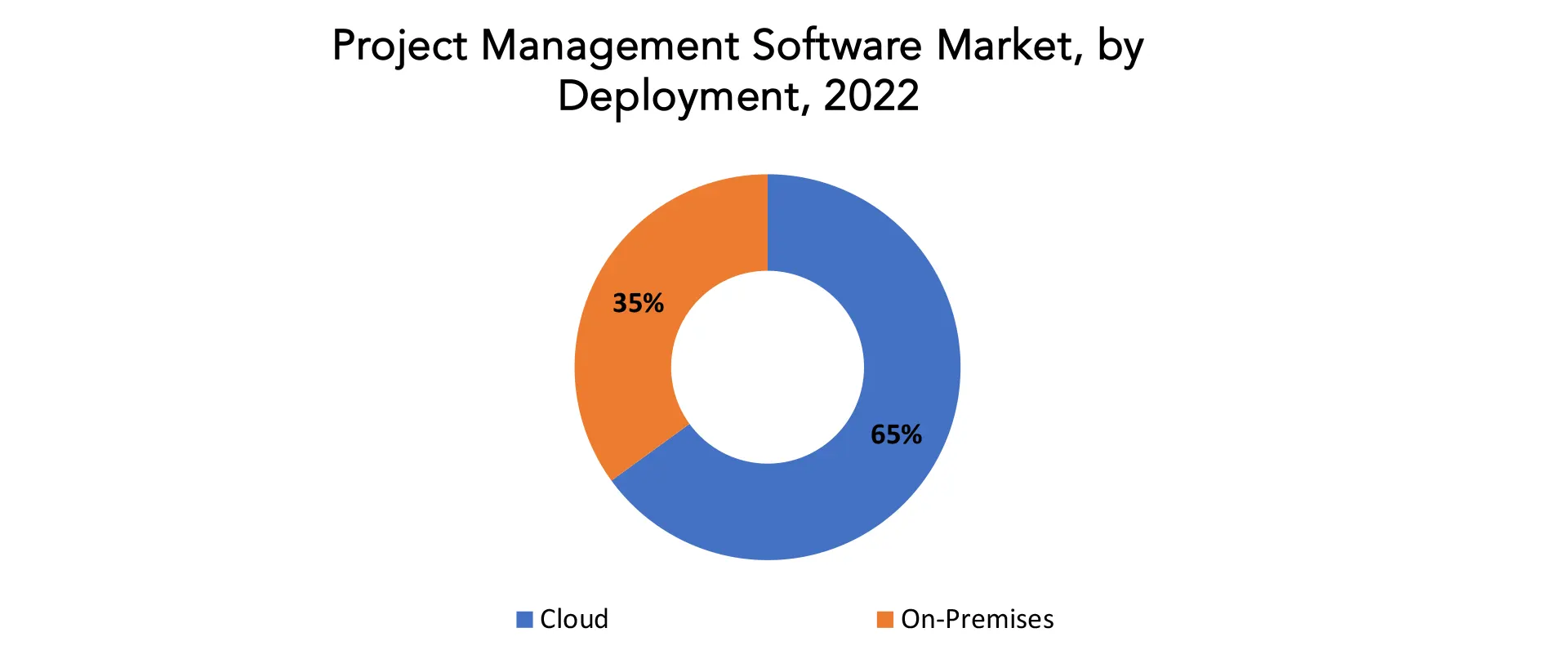
Based on organization, the market is bifurcated into large enterprises and SMEs. Large organizations often account for a sizable share of the Project Management Software market. These enterprises, which are distinguished by broad operations, complicated projects, and large teams, frequently invest in strong and feature-rich project management systems. The percentage distribution for big organizations may be significant, demonstrating the desire for advanced project management solutions that can handle the scope, complexity, and diversity of their projects. These systems may provide powerful reporting, resource management, and integration capabilities.
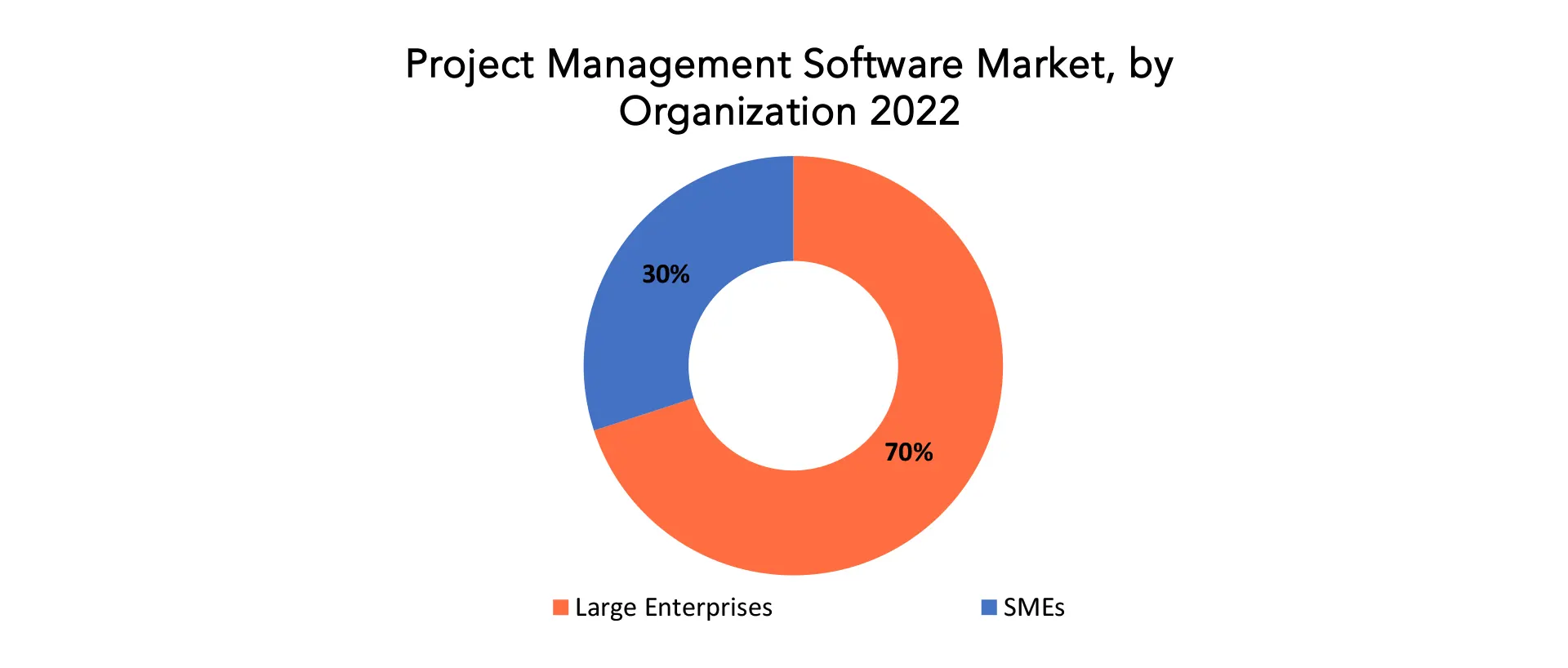
Despite their modest size, SMEs account for a sizable portion of the Project Management Software industry. Recognizing SMEs’ unique demands and financial constraints, there is a growing trend toward providing user-friendly, cost-effective, and scalable project management solutions suited to their individual needs. Because of their flexibility and cost, cloud-based project management systems are frequently used by SMEs. The percentage distribution for SMEs varies but is often high, demonstrating the market’s sensitivity to the demands of smaller firms seeking effective project management solutions.
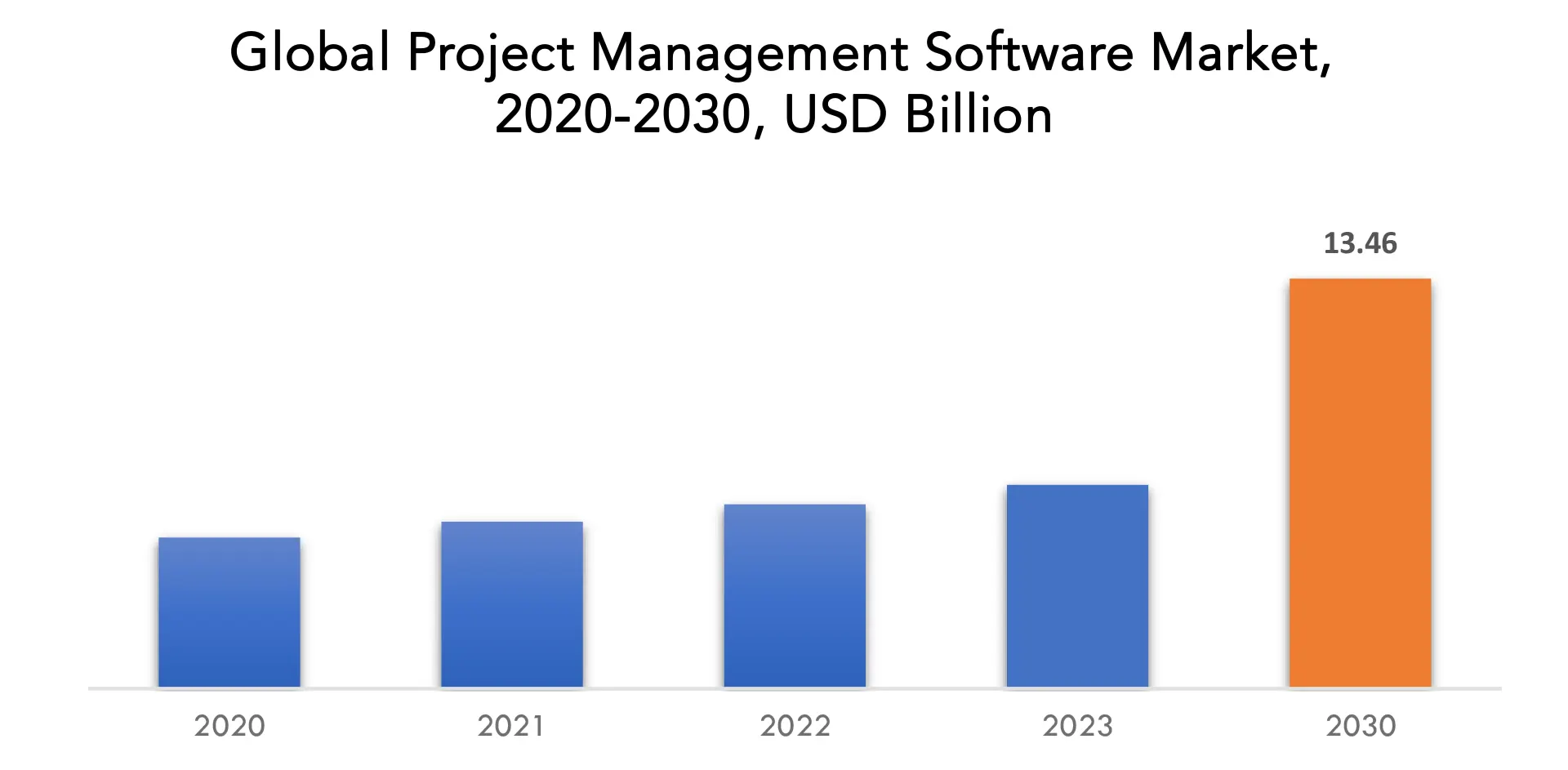
Project Management Software Market Competitive Landscape
The competitive landscape of the Project Management Software market was dynamic, with several prominent companies competing to provide innovative and advanced Project Management Software solutions.
- Adobe Inc.
- Asana Inc.
- Atlassian Corporation Plc.
- Basecamp
- Broadcom Inc.
- Citrix Systems, Inc.
- Deltek, Inc.
- Elecosoft
- Hive
- MeisterLabs
- Microsoft Corporation
- com
- NetSuite
- Oracle Corporation
- Plainview
- com
- SAP SE
- ServiceNow
- Smartsheet,
- Total Synergy
- Wrike, Inc.
- Zoho Corporation Pvt. Ltd.
Recent Developments:
November 7, 2023- Oracle today announced a multi-year agreement with Microsoft to support the explosive growth of AI services. Microsoft is using Oracle Cloud Infrastructure (OCI) AI infrastructure, along with Microsoft Azure AI infrastructure, for inferencing of AI models that are being optimized to power Microsoft Bing conversational searches daily.
October 10, 2023- The world’s largest creativity conference – Adobe (Nasdaq:ADBE) announced over 100 major innovations and updates across Creative Cloud that dramatically advance power and precision for creative professionals.
Project Management Software Market Dynamics
Driver
Productivity and efficiency are becoming increasingly important to organizations across sectors.
In the modern corporate environment, where firms compete in a dynamic and competitive market, there is a growing emphasis across industries on productivity and efficiency. Organizations turn to Project Management Software as a strategic solution when they see the need to manage resources and streamline project procedures. These technologies are critical in increasing productivity by offering a centralized platform for better team collaboration, task management, and communication. Project Management Software enables firms to make educated decisions, manage resources wisely, and detect possible bottlenecks in project execution by providing capabilities such as real-time project monitoring, resource allocation, and time tracking. The ability to automate regular processes, set clear deadlines, and promote smooth communication all contribute to a more effective project management process. As organizations strive to accomplish more with fewer resources and shorter timelines, the use of Project Management Software becomes critical to achieving increased productivity and efficiency, ultimately contributing to the overall success and competitiveness of businesses in today’s fast-paced and demanding market.
Restraint
Project Management Software deployment may be complicated, involving substantial time and money.
Implementing Project Management Software introduces a degree of complexity to organizational activities, needing careful study and strategic planning. The procedure entails dedicating significant time and resources to smoothly integrate the software into current operations. One of the key obstacles is integrating these solutions into the complex IT systems of bigger organizations. These enterprises frequently have a plethora of current systems, databases, and applications that must coexist with the new project management solution. A thorough awareness of the organization’s present technology ecosystem, possible data transfer problems, and the identification of interfaces with other technologies is required to achieve seamless integration. The difficulty is increased when it comes to assuring data consistency, security, and compliance with current processes. Employee resistance to change can also stymie implementation. Overcoming these issues necessitates a well-planned approach combining collaboration among IT specialists, project managers, and end users. To guarantee a seamless transition, successful implementation necessitates addressing the organization’s specific needs, avoiding any interruptions, and offering extensive training. While the difficult installation and integration process might be a hindrance, overcoming these obstacles is critical for realizing the full potential of Project Management Software in improving organizational efficiency and cooperation.
Opportunities
The growing popularity of cloud-based Project Management Software represents huge possibility.
The increased demand for cloud-based Project Management Software represents a fundamental shift in how firms approach project management in today’s business world. This trend creates a significant potential for software suppliers as firms emphasize flexibility, scalability, and accessibility in project management systems. Cloud-based Project Management Software provides a dynamic and collaborative platform that effortlessly matches with the rising trend of remote work. The capacity to access project-related information and tools from any place with internet availability is a significant benefit, particularly in a worldwide and scattered workforce. Furthermore, cloud solutions are scalable, allowing firms to change their project management resources depending on changing demands without the limits of traditional on-premises systems. This adaptability is especially appealing to organizations of all kinds, from small and medium-sized enterprises (SMEs) to major corporations, who are looking for agile solutions that can change with their changing project requirements. The advantages of cloud computing, such as cost-effectiveness, automated upgrades, and better security measures given by trustworthy cloud service providers, add to the appeal of cloud-based Project Management Software. As organizations grapple with the complexity of remote collaboration and look for more effective methods to manage projects, the need for cloud-based solutions creates a strategic opportunity for software suppliers to meet the changing demands of modern enterprises.
Project Management Software Market Trends
- The trend toward remote work has intensified, and project management software is changing to better accommodate distant teams. Real-time collaboration, cloud access, and communication solutions are in great demand.
- AI and automation are rapidly being integrated into project management software for activities such as predictive analytics, smart work assignment, and process optimization. These technologies improve decision-making and efficiency.
- Innovative methods are gaining acceptance and have an impact on Project Management Software trends. Agile approaches, iterative development, and rapid response to changes are all becoming increasingly common.
- To increase adoption rates, project management software companies prioritize simple interfaces, quick navigation, and overall user-friendly designs.
- With the growing use of mobile devices, there is a shift toward mobile-centric Project Management Software. Mobile workforces require applications that allow for on-the-go access, task management, and communication.
- There is an increasing need for Project Management Software with enhanced analytics and reporting capabilities. Organizations desire solutions that give full insights into project performance to help them make better decisions.
- Users are increasingly seeking Project Management Software that can be tailored to unique processes. Scalability is also an important factor to consider, since it allows solutions to evolve to meet the changing demands of companies.
- Due the importance of project-related data, there is a tendency toward increasing security measures inside Project Management Software. End-to-end encryption, safe cloud storage, and compliance with data security standards are essential.
Project Management Software Market Regional Analysis
North America, particularly the United States, has historically been a dominant force due to strong adoption rates of modern technologies, a solid IT infrastructure, and a huge number of organizations driving demand for Project Management Software. Europe, with substantial contributions from nations such as the United Kingdom and Germany, follows closely in terms of market influence, driven by a technologically sophisticated environment and a strong emphasis on project management approaches. The Asia Pacific area is seeing tremendous growth, fueled by rising technology use, economic development, and the expansion of enterprises using digital solutions, particularly in China and India.
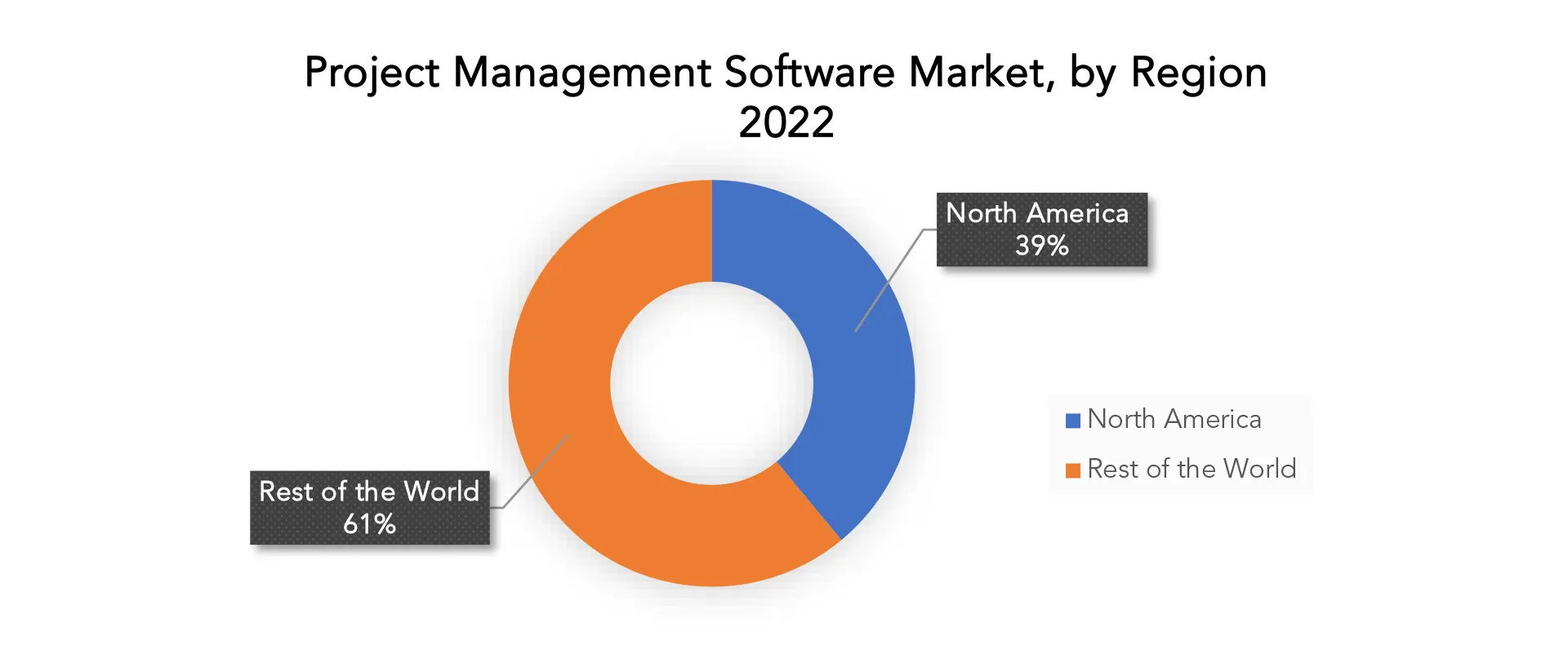
The Middle East and Africa area is expected to be the second fastest-growing region in the project management software industry. During the forecasted time, the region is expected to increase by 4.2X. The increased use of construction project management software by the construction sector in the Middle East and Africa area is likely to boost market growth in the region. The increased use of construction project management software by project managers to manage projects efficiently in the Middle East and Africa area is contributing to the development of the project management software market.
Target Audience for Project Management Software Market
- Project Managers
- Team Members
- Business Executives and Leaders
- IT Managers and Professionals
- Portfolio Managers
- Product Managers
- Construction Project Professionals
- Marketing and Event Managers
- Consultants
- Government Agencies
- Educational Institutions
- Healthcare Professionals
- Supply Chain and Logistics Managers
Segments Covered in the Project Management Software Market
Project Management Software Market by Deployment
- Cloud
- On-Premises
Project Management Software Market by Organization
- Large Enterprises
- SMEs
Project Management Software Market by Industry
- Building and Construction
- Retail
- Hospitality
- IT & Telecom
- Energy and Utilities
- Manufacturing
- Government
- Others
Project Management Software Market by Region
- North America
- Europe
- Asia Pacific
- South America
- Middle East and Africa
Key Question Answered
- What is the expected growth rate of the Project Management Software market over the next 7 years?
- Who are the key market participants in Project Management Software, and what are their market share?
- What are the end-user industries driving market demand and what is their outlook?
- What are the opportunities for growth in emerging markets such as Asia-Pacific, the Middle East, and Africa?
- How is the economic environment affecting the Project Management Software market, including factors such as interest rates, inflation, and exchange rates?
- What is the expected impact of government policies and regulations on the Project Management Software market?
- What is the current and forecasted size and growth rate of the global Project Management Software market?
- What are the key drivers of growth in the Project Management Software market?
- Who are the major players in the market and what is their market share?
- What are the distribution channels and supply chain dynamics in the Project Management Software market?
- What are the technological advancements and innovations in the Project Management Software market and their impact on product development and growth?
- What are the regulatory considerations and their impact on the market?
- What are the challenges faced by players in the Project Management Software market and how are they addressing these challenges?
- What are the opportunities for growth and expansion in the Project Management Software market?
- What are the product offerings and specifications of leading players in the market?
FAQ
The global Project Management Software market size was is projected to grow from USD 6.69 billion in 2023 to USD 13.46 billion by 2030, exhibiting a CAGR of 10.5% during the forecast period.
North America accounted for the largest market in the Project Management Software market.
- Adobe Inc., Asana Inc., Atlassian Corporation Plc., Basecamp, Broadcom Inc.,Citrix Systems, Deltek, Elecosoft, Hive, MeisterLabs, Microsoft Corporation,Monday.com, NetSuite, Oracle Corporation, Plainview, ProjectManager.com, SAP SE, ServiceNow, Smartsheet, Total Synergy, Wrike, Zoho Corporation Pvt. Ltd.
Project Management Software as a Service (SaaS) approaches are becoming increasingly popular. The subscription-based model provides flexibility, frequent upgrades, and cost-effectiveness.
In-Depth Database
Our Report’s database covers almost all topics of all regions over the Globe.
Recognised Publishing Sources
Tie ups with top publishers around the globe.
Customer Support
Complete pre and post sales
support.
Safe & Secure
Complete secure payment
process.
